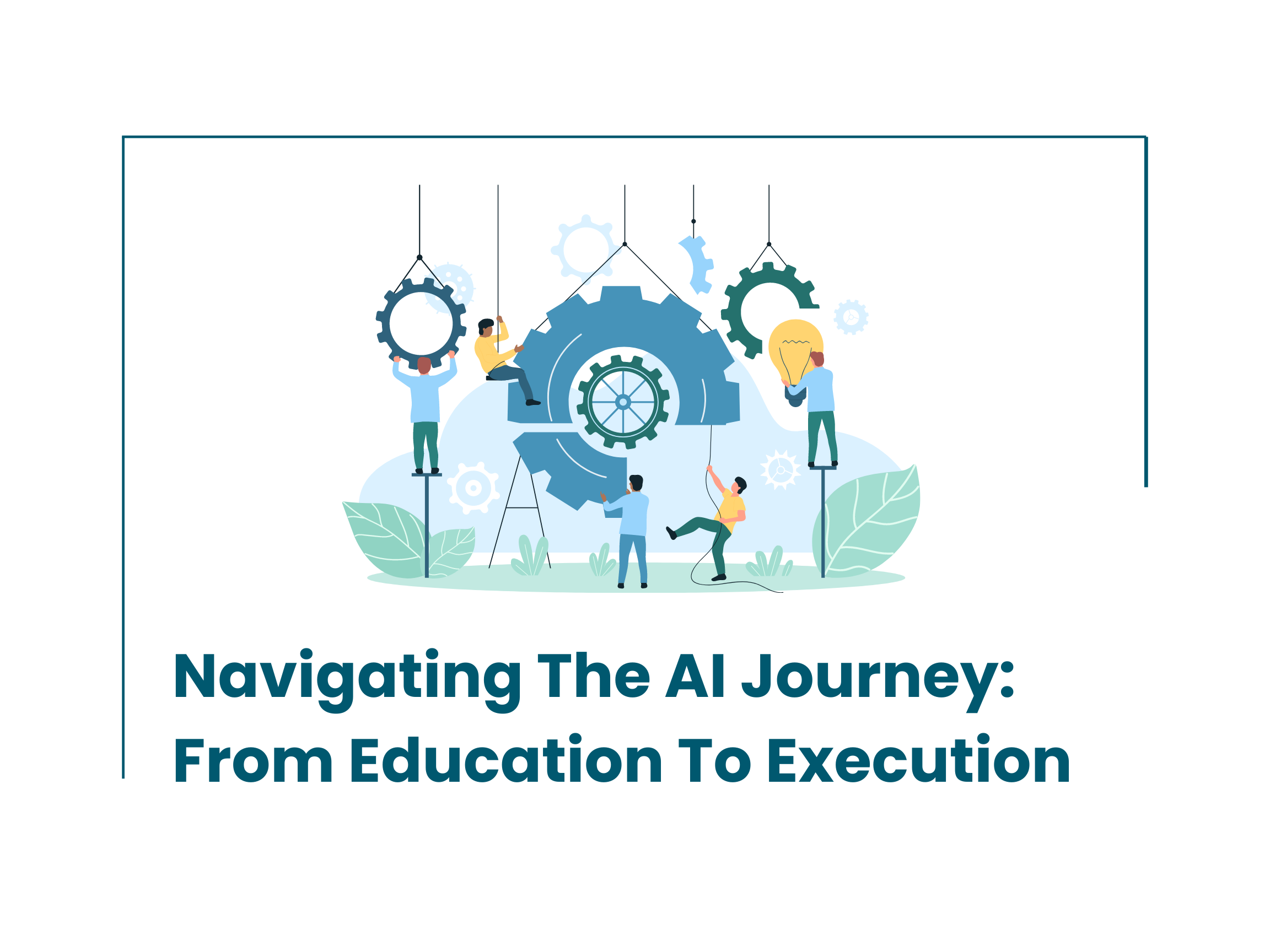To harness AI's full potential, your approach should be comprehensive and structured, focusing on three crucial steps—AI Education, AI Strategy, and AI Execution. By following the AI Journey steps in sequential order, you can build a robust foundation for your AI initiatives. These three steps are interdependent and collectively form a robust foundation, enabling your team to achieve successful AI implementation. Without proper AI education and training, your team won't fully grasp AI's potential. Without a strong strategy in place, your efforts may lack direction. And without effective execution, even the best plans can fail to deliver.
In this article, we’ll dive into each step and explore actionable activities that will help you master the AI journey for your business.
AI Education: Elevate Your Team
AI Education serves as the cornerstone of your organization's AI journey. Equipping your team with the essential knowledge and skills to understand and effectively utilize AI is fundamental to successful implementation. Comprehensive education helps to dispel prevalent myths, clarify complex concepts, and build confidence across your organization, ensuring alignment and a shared understanding of AI’s potential and challenges.
A well-rounded AI education program can take various forms to accommodate different learning styles and organizational needs. Subscribing to industry-specific newsletters offers continuous updates and valuable insights, keeping your team informed about the latest developments and trends. Hosting company-wide educational sessions, such as Louder Co.'s AI Keynote, provides in-depth knowledge and fosters a culture of continuous learning and innovation. Additionally, online courses, webinars, and workshops deliver hands-on experience and practical skills, essential for ongoing AI education and proficiency.
When designing your AI education programs, it’s essential to focus on several key topics that are universally important across all industry sectors. For example, understanding AI tools and technologies is fundamental, as it enables your team to leverage the right resources effectively. It’s also important to educate your team on data management practices since data is the lifeblood of AI. Proper data handling, storage, and analysis are critical components of successful AI projects. Leaders should also consider discussing the future of AI and its potential impact on your industry to inspire innovative strategic planning. This approach helps your team anticipate trends and prepare for future challenges.
By comprehensively covering these areas, you will prepare your team to navigate the complexities of AI with confidence and competence. This thorough education not only forms the bedrock of your AI strategy but also empowers your organization to harness the full potential of AI, driving meaningful business outcomes and sustaining a competitive edge in the industry.
AI Strategy: Crafting a Roadmap for Success
The second step in your AI journey is building a clear and actionable AI strategy so you can reach your company’s vision and ROI goals. Developing an AI strategy isn't just about keeping up; it's about setting the pace for industry innovation. A strategic roadmap ensures your AI initiatives align with your business goals, facilitating scalability and adaptability as your organization grows.
This process typically begins with an AI readiness assessment and stakeholder interviews to gain a comprehensive understanding of your organization's needs. The AI readiness assessment evaluates how prepared the organization is to adopt AI. It highlights strengths and identifies areas that need improvement, providing a baseline for your strategy. Stakeholder interviews are crucial for identifying key pain points that need to be prioritized within the AI strategic roadmap. Collaborating with an AI expert is highly recommended, as they can significantly streamline this process and provide valuable insights from an external perspective.
Once you have a comprehensive understanding of your goals and readiness, the next step is to construct a robust AI strategy. This involves detailing suggested projects and outlining actionable steps for implementing AI within your business. Your strategy should be both flexible and focused, enabling adjustments as your AI journey evolves. A well-defined roadmap will position you to effectively achieve your vision and ROI goals, ensuring that the AI initiatives align with your overarching business objectives. By maintaining strategic agility and following a plan, you can navigate the complexities of AI implementation with confidence and precision, driving sustained growth and innovation.
AI Execution: Transform Your Business With Seamless Execution
The last step in your AI journey is execution, where selecting the right systems and technologies to support your AI initiatives becomes paramount. Working alongside an AI consultancy like Louder Co. will ensure seamless integration and measurable results from day one.
After the system selection process is completed, effectively managing software implementation is crucial for a successful rollout. This phase involves several intricate steps that ensure the seamless integration of AI into your business operations. Key tasks include thorough process documentation to establish clear guidelines, precise software configuration to tailor the AI system to your specific needs, and comprehensive change management to facilitate smooth transitions and foster user adoption.
In addition, continuous performance evaluations are essential to monitor the AI system's effectiveness and make necessary adjustments. This structured approach not only ensures that AI projects are delivered on time and within budget but also positions your organization for sustainable growth and innovation. By meticulously managing each aspect of AI Execution, you can maximize the benefits of AI and drive long-term success in your AI initiatives.


